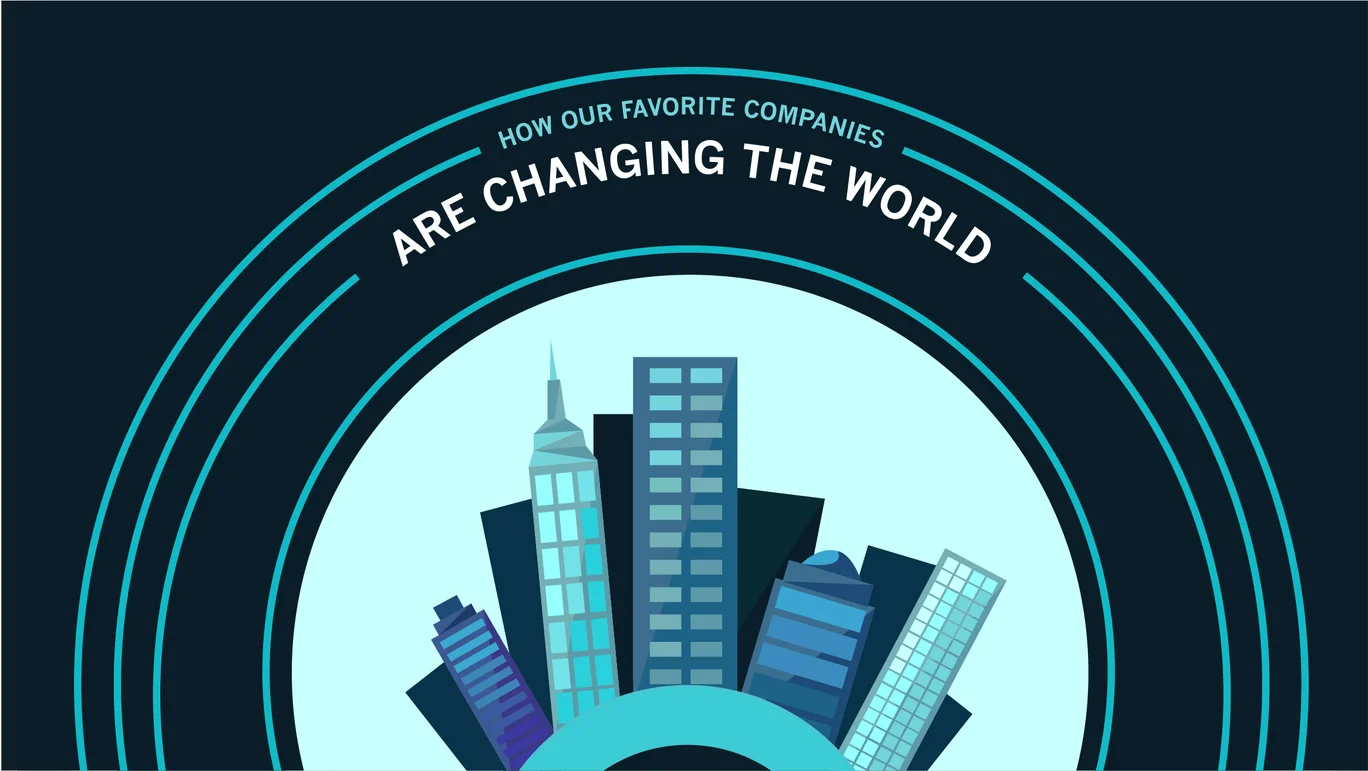Would you spend the extra dollar on a brand name product if part of the proceeds were used for the greater good? Brands you love are changing the world through social responsibility. When you buy from them, you're investing in something bigger than yourself.
So, would you spend the extra dollar? A 2012 study conducted by Reputation Institute concluded, “people’s willingness to buy, recommend, work for, and invest in a company is driven 60% by their perceptions of the company, and only 40% by their perceptions of the products.”
This psychological concept is a driving force that marketers are constantly utilizing to simultaneously boost sales and brand loyalty. This concept is known as corporate social responsibility (CSR), and it has the power to make or break a company.
Much of this social responsibility revolves around sustainability, community, and accountability. Companies embrace these characteristics by getting behind a certain cause (or causes) and integrating that cause into their business strategy. This top-down approach is ultimately meant to shape a positive reputation for the company through the eye of the consumer.
Some of the most well established and successful forms of CSR belong to your favorite and most beloved companies and brands. Take a look at three of the most well known brands and how their corporate responsibility is changing the world and the face of business.
#1: Starbucks:
We have all had a cup of Starbucks at one point in our lives. This company has expanded itself from just any ordinary coffee shop into its own empire. The Starbucks brand prides itself on environmental sustainability--a cause that companies and industries are rapidly grasping onto.
Specifically, Starbucks focuses on providing products through ethical and sustainable sourcing, being a leader a green retail, creating opportunities, and encouraging service and citizenship.
Some of the approaches Starbucks takes to ensure these standards are met are very diversified. A handful of these strategies incorporate transparent relationships with crop farmers. Most importantly, in 2004, the coffee empire formally introduced a set of coffee-buying guidelines titled “Coffee and Farmer Equity” (C.A.F.E.) Practices.
According to the Starbucks Corporate Social Responsibility Report in 2006, “These guidelines were designed to ensure the sustainable supply of high-quality coffee; achieve economic accountability; promote social responsibility within the coffee supply chain; and protect the environment.”
These measures have helped make Starbucks its own powerhouse but most importantly they have opened several doors for sustainable development, economic advancement, and awareness in the coffee industry.
#2: Microsoft:
Microsoft, the global software giant, is also making waves in social responsibility. Microsoft takes an active approach by utilizing the power of technology to address issues pertinent to human rights, privacy and data security, corporate governance and ethics, public policy and engagement, and responsible sourcing.
Specific to human rights, the company has chosen to focus on groups that are more prone to neglect and vulnerability. They focus on certain conventions like the elimination of all forms of discrimination against women, the rights of children, and the rights of persons with disabilities. In 2012, Microsoft launched their initiative “MicrosoftYouthSpark” which connects millions of children across the globe with opportunities in education, entrepreneurship,and technology.
With increasing concern of government interference and surveillance, transparency with its customers is a necessity for Microsoft. They do not provide the government with any type of direct or “back door” access to customer data and have actually earned legal victory regarding government surveillance practices.
Dan Bross, Microsoft’s Senior Director of Citizenship and Public Affairs stated, “Our CSR efforts have a direct and positive impact on people in our own backyard and around the world, and in turn, their ongoing engagement with us contributes to Microsoft’s business success.”
To read more about how Microsoft is helping to change the world, visit their website and check out this Forbes article.
#3 TOMS shoes
The slogan “One for One” perfectly illustrates the CSR model of TOMS footwear and its philanthropic mission. The footwear company isn’t just known for its popular and stylish shoes, but more so for their commitment to service and global development.
The primary goal of their business model is to give a pair of shoes to someone in need whenever a customer purchases a pair of TOMS. Essentially, the giving doesn’t stop. This simple idea has developed itself into a powerful and inspirational model that has expanded into a diverse range of products.
In 2011, TOMS launched their eyewear line which has helped over 400,000 regain their sight.
In addition, with TOMS’ recent expansion into the production of coffee, they have been able to work with their Giving Partners to provide a one week supply of safe and clean water to a person in need. This initiative also aids in acquiring access to safer birthing measures.
The 2015 launch of TOMS Bag Collection was founded in order to provide appropriate training and the distribution of supplies to provide for a safe delivery to women that do not have access to a hospital.
With every purchase of a TOMS product, a portion of the proceeds is distributed among 70 countries. TOMS footwear stands out in the retail industry because it is not just one product’s profitability that contributes to a noble cause, but it is every product that TOMS produces, which makes the company so special.
Learn more about what TOMS is all about and what they have done to fix issues close to their heart on their website.
Corporate Responsibility is becoming an extremely important principle in the success of businesses, whether they are big or small. People want the world to be a better place and make meaningful purchases.
Companies and brands are noticing this and are using this mindset to not only make themselves more successful, but to do their part to better society and our great planet.




